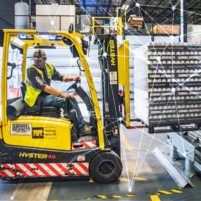Ensuring Smart Cities Benefit Everyone

With the aid of technology, people may live in communities that are more responsive to their needs and genuinely have the potential to improve their lives. A 23-foot-tall smog-sucking air purifier is now being tested in Beijing, a city notorious for its extreme pollution levels. It will purify the city's air before it is released into the atmosphere.
Reality does not like the futuristic vision shown in "The Jetsons" in the slightest. Realistic urban areas respond in real-time as the time of day or weather changes as the needs of their citizens change. A whole community may be involved in these endeavours. Examples of this category include monitoring traffic to ensure that autos are moving efficiently or sensing air quality to alert residents (or turn on enormous air purifiers) when pollution levels are rising.
The process of using data and electrical sensors in this way is sometimes referred to as "building smart cities." A worldwide effort is being undertaken to improve how cities function via the development of "smart cities." The promise of real-time monitoring, analysis, and improvement in municipal decision-making is at the core of the notion of a smart city, which was established partly as a response to historically inconsistent methods for building urban infrastructure and urban planning. Supporters hope the results will increase efficiency, environmental sustainability, and public engagement.
Smart city programs include substantial financial outlays with the goal of affecting social norms. Decisions made early in the process affect the changes that will occur. In contrast, most research and planning for smart cities is driven by technical advances rather than the population's needs. The transformations in society, legislation, and organization that will be required to ensure that smart cities are not only technologically sophisticated but also intellectually responsive to the needs of their residents are not considered nearly enough. The design of smart city programs will decide whether or not they achieve their promise of enhancing the lives of citizens or whether these disparities are really increased or even reinforced.
A more efficient city reaps the benefits
To put it another way, smart cities are designed to be as efficient as possible. Government agencies, society, and the environment may benefit from tools that are built with a high degree of precision. Through the elimination of redundancies and cost savings, as well as the standardization and consolidation of municipal personnel responsibilities, smart cities may improve municipal service delivery. The results might lead to more affordable and higher-quality treatments.
If you're a resident of or a visitor to the city, you may pay for bus and subway tickets more quickly and securely thanks to a new system established in 2014 by the Transport For London transport agency. When users touch or tap their phone or another mobile device on a scanner, a wireless transaction will take the required amount out of their bank account. Passengers enter and depart the system in this manner.
The cost of running the city's fare payment system will be lowered, saving the city money. Rather than manufacturing and distributing specific smartcards that can be used at fareboxes, the city can avoid this. Convenience, quickness, and capped fares provide the best value for public transportation users' contactless travel over a day or over seven days since efficiency benefits them in these ways.
Indirect consequences to the environment
Aside from saving expenses, real-time monitoring of energy consumption may assist in identifying areas that require improvement in terms of environmental effects.
On municipal light poles in Chicago, sensors and cameras have been mounted to collect data on air quality, noise, temperature, water levels in streets and gutters, and traffic as part of the city's "Array of Things" effort.
A "fitness tracker for the city" is expected to uncover ways to minimize energy usage, identify answers to the issue of urban flooding, and improve the quality of life for residents.
Providing assistance to locals
One of the smart cities movement's significant advantages is likely to improve people's quality of life. The selections include a broad range of themes, including housing and happiness, transportation, and optimism, educational services, environmental conditions, and contacts with the community.
In this category of endeavours, residents' health monitoring, and mapping, using data to fight neighbourhood blight, detecting prejudice, and deploying autonomous cars to enhance residents' safety and mobility are all examples.
Keeping the focus on customer service rather than on administrative tasks
Smart city efforts are supposed to result in several government-related efficiency gains. As a result, governmental organizations and their employees will be the first to reap the benefits. The premise, of course, is that anything that benefits the government is likewise beneficial to the wider public.
On the other hand, innovations that benefit the broader population tend to be overlooked. Alternatively, it is possible to destabilize it for different reasons.
For example, the global market for smart cities is expected to be rather significant. Cities are eager to acquire new technology, and businesses are eager to sell their goods and services to municipalities. Thus, it may be assumed that smart cities are advantageous to everyone who lives there.
Also, a city's leaders may use the "self-congratulatory" talk about smart cities to generate a broadly positive view of the city. Use the word "smart city" to do this. Promoting the city's technology advancements and improved connectivity to prospective residents and businesses alike may be done efficiently.
If municipal officials see smart city efforts as means to help the government, residents' lives may not continually improve. As a matter of fact, it may either enhance or worsen pre-existing problems.
Is it smart city building those benefits everyone?
To implement smart city programs, governments must judge who would benefit from those efforts and who will be overlooked. No two parts of a smart city will be exactly the same in terms of "smartness," even if it is done unintentionally, as it frequently is. On the other hand, certain regions will have a more significant concentration of air quality monitors and cameras for traffic.
An initiative that provided low-wage and underemployed Philadelphians with job training on their smartphones failed to overcome the city's vast socio-economic divide. In addition, the effort failed to address additional concerns. In the opinion of a researcher, the project was little more than "empty policy language" designed to encourage businesses to participate.
Songdo City, South Korea's much-touted new city, required enormous governmental and private sector investments. The ultimate objective was to create an urban innovation and economic hub known as a "smart city." And yet, ten years after it began, those who call it a "work in progress" are the ones who offer it the highest praise. Some have called it a complete failure, while others have been less kind. Our future smart cities should be mindful of the fact that Songdo was built from the ground up as a "high-tech utopia" with no history or people at its core.
To prevent the disasters detailed above, governmental authorities, business leaders, and citizens must closely monitor attempts to build smart cities in their areas. The initiatives that are carried out must conform to both the concept of openness and the purpose of bringing about social change that is widely accepted. Neither technology nor the end goal can be the primary emphasis. Creating smart cities is a highly political endeavour, much like any other kind of urban expansion or redevelopment. When municipal authorities take action, they should be held accountable for the repercussions of that action, rather than just simplifying administrative processes. This is the responsibility of citizens.
Explore more
Need any help in IoT?
Need any help in IoT? An Atreyo expert identify the right solution for your needs.
If ready to talk to an Atreyo expert
Interested in IoT products? go to







